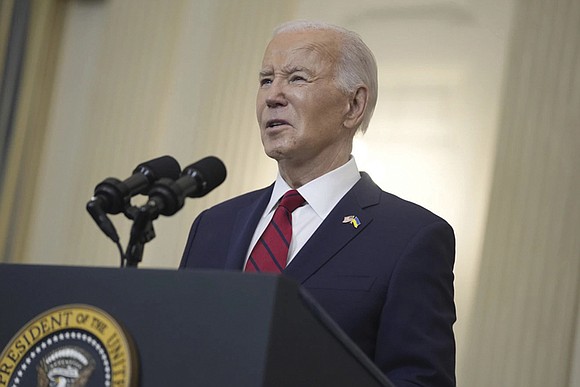President Biden signs $95B bill for war aid in Ukraine
Funds include $26B in aid for Israel, $1B in for Palestinians in Gaza
Associated Press | 4/25/2024, 6 p.m.

President Joe Biden said on Wednesday that he was immediately rushing badly needed weaponry to Ukraine as he signed into law a $95 billion war aid measure that also included assistance for Israel, Taiwan and other global hotspots.
The announcement marked an end to the long, painful battle with Republicans in Congress over urgently needed assistance for Ukraine, with President Biden promising that U.S. weapons shipment would begin making the way into Ukraine “in the next few hours.”
“We rose to the moment, we came together, and we got it done,” President Biden said at a White House event to announce the bill signing. “Now we need to move fast, and we are.”
But significant damage has been done to the Biden administration’s effort to help Ukraine repel Russia’s invasion during the funding impasse that dates back to August, when the Democratic president made his first emergency spending request for Ukraine aid. Even with a burst of new weapons and ammunition, it’s unlikely Ukraine will immediately recover after months of setbacks.
President Biden immediately approved sending Ukraine $1 billion in military assistance, the first tranche from about $61 billion allocated for Ukraine.
The package includes air defense capabilities, artillery rounds, armored vehicles and other weapons to shore up Ukrainian forces who have seen morale sink as Russian President Vladimir Putin has racked up win after win.
Meanwhile, Ukraine for the first time has begun using long-range ballistic missiles provided secretly by the United States, bombing a Russian military airfield in Crimea last week and Russian forces in another occupied area overnight, American officials confirmed Wednesday. The U.S. is providing more of the Army Tactical Missile System, known as ATACMS, in the new military aid package, according to one official who was not authorized to comment and spoke on the condition of anonymity.
Still, longer term, it remains uncertain if Ukraine — after months of losses and sustaining massive damage to its infrastructure — can make enough progress to sustain American political support before burning through the latest influx of money.
“It’s not going in the Ukrainians’ favor in the Donbas, certainly not elsewhere in the country,” said White House national security spokesman John Kirby, referring to the eastern industrial heartland where Ukraine has suffered setbacks. “Mr. Putin thinks he can play for time. So we’ve got to try to make up some of that time.”
Tucked into the measure is a provision that gives TikTok’s Beijing-based parent company, ByteDance, nine months to sell it or face a nationwide prohibition in the United States. The Biden administration and a bipartisan group of lawmakers have called the social media site a growing national security concern, which ByteDance denies.
The bill also includes about $26 billion in aid for Israel and a surge of about $1 billion in humanitarian relief for Palestinians in Gaza suffering as the Israel-Hamas war continues.
President Biden said Israel must ensure the humanitarian aid for Palestinians in bill reaches Gaza “without delay.”
House Speaker Mike Johnson delayed a vote on the supplemental aid package for months as members of his party’s far right wing, including Reps. Marjorie Taylor Greene of Georgia and Thomas Massie of Kentucky, threatened to move to oust him if he allowed a vote to send more assistance to Ukraine. Those threats persist.
Former President Trump, the presumptive 2024 presidential GOP nominee, has complained that European allies have not done enough for Ukraine. While he stopped short of endorsing the supplemental funding package, his tone has shifted in recent days, acknowledging that Ukraine’s survival is important to the United States.
Indeed, many European leaders have long been nervous that a second Trump presidency would mean decreased U.S. support for Ukraine and for the NATO military alliance. The European anxiety was heightened in February when Mr. Trump in a campaign speech warned NATO allies that he “would encourage” Russia to “do whatever the hell they want” to countries that don’t meet defense spending goals if he returns to the White House.
President Biden lamented that the package did not include money to bolster U.S. border security.
The White House had proposed including in the package provisions it said would have helped stem the tide of migrants and asylum seekers coming to the U.S. Republicans, however, rejected the proposal at the urging of Mr. Trump, who did not want to give President Biden the win on an issue that’s been an albatross for the Democratic administration.







